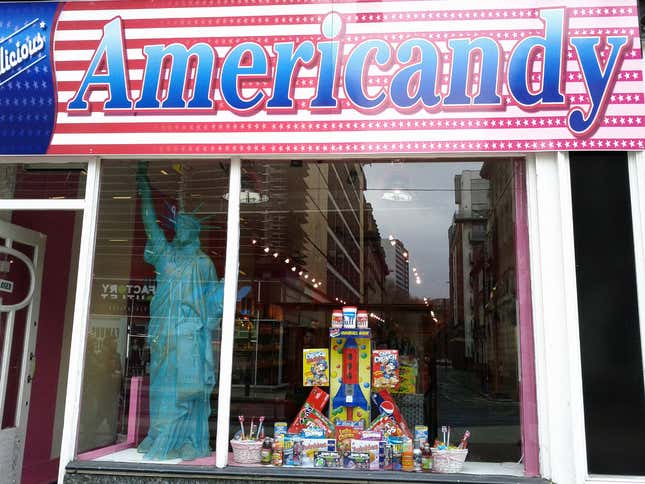
Cultural exports often take the shape of a nation’s pride, pushing high culture or value-added products to other countries’ consumers. Think high-performance cars from Germany, Danish furniture, Swedish murder mysteries, Korean electronics, or British period dramas. Imagine my shock, then, upon discovering that one of the hottest US exports to the UK market: sugary snacks. Eager young Brits looking for an imported sugar high can now get their fix, sold by one of several new retailers specializing in the import of crates of sweet cereals like Cap’n Crunch and Lucky Charms, Mountain Dew soda and Sugar Daddy candies, all a riot of color and corn syrup. It’s all meant to appeal to the tastes of those who might have experienced American candy on vacation, for example, and want more of it at home for their personal stash.
I came face-to-face with this phenomenon in Manchester’s main city square, in the form of Americandy, an eye watering storehouse of everything from Pop-Tarts to garish colors of Fanta and Jones Soda Co drinks to two species of Marshmallow Fluff, plain and strawberry. Cereal boxes, packaged and bulk sweets, even twinkies sold a la carte at the cash register, beckoned from the front window of this shop that opened in 2012 in the city’s bustling business district. According to the manager on duty, the shop is one of several in northern England, and does a brisk business of teens dropping in on a Saturday to load up before going out (and presumably staying up all night).
Americandy isn’t alone in tapping into the British taste for US-made candy delights. The Stateside Candy Co. started as mail order, but now has several brick and mortar stores, and 4th of July also runs an online shop in addition to an actual store. Stateside appears to have been one of the pioneers, which launched after finding success with excess Reese’s candy on eBay after an American vacation. Last year it moved around £3.4 million ($1.2 million) in product in the UK alone.
Under austerity, you might think the UK candy market would take a hit, but, unlike many other sectors, sweets have grown in sales, and will continue to, according to Mintel. The global research firm says that candy is “one of the few recession-proof food and drink markets, with consumers not cutting chocolate out of their diets despite pressure on many household budgets.” Price inflation, of the kind I saw in Americandy, has helped profits rise steadily. Stocking up on these products can set you back, say £1.50 ($2.28) for a Sugar Daddy, or £5.00 ($7.61) for a box of Pop-Tarts.
And, as the coalition government well knows from it’s succession of the 2011 royal wedding, followed by the 2012 London Olympic Games and the Queen’s Diamond Jubilee, keeping the people buzzed on cake and fizzy drinks helps compensate for otherwise grim times. Or, as Professor Lupin told Harry Potter in the perfect metaphor for austerity Britain, “Eat this, it’ll help. It’s alright, it’s chocolate.”